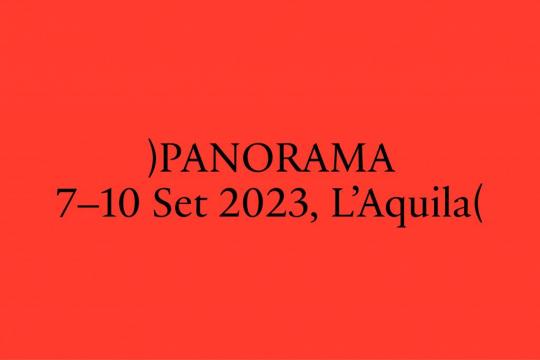
07.09.2023 > 10.09.2023
a city-wide exhibition curated by Cristiana Perrella
Back again from 7 to 10 September 2023 Panorama is the cultural project that ITALICS – the first institutional network to bring together seventy of the most authoritative art galleries in Italy – annually dedicates to some of the most extraordinary locations in our country.
After the editions of Procida (2021) and Monopoli (2022), both curated by Vincenzo De Bellis, ITALICS chose L’Aquila for the third edition of Panorama and invited Cristiana Perrella – curator and art critic – to conceive a multi-site exhibition for the Abruzzo capital.
L’Aquila was founded on the slopes of Gran Sasso in 1254 and rebuilt in 1266 by Charles I of Anjou. It was initially part of the Kingdom of Naples, then of the Hapsburg kingdom and then the Kingdom of the Two Sicilies. In its long history, it has known moments of power and splendor alternated with phases of decline, destruction, reconstruction and rebirth, related to the violent earthquakes that have struck it throughout its history, including the particularly dramatic one of 2009. Over the centuries, the city’s location in the heart of Italy, surrounded by imposing mountains, forests, lakes and waterways, has given it wealth and a strategic importance both politically and religiously, as well as economically and culturally. Today, there is still strong evidence of this history in the architecture and artistic heritage, and the legacy is kept alive through religious rites such as the Perdonanza Celestiniana and the prestige of institutions such as the Conservatory, the University and the Academy of Fine Arts.
The focus in the new edition of Panorama, curated by Cristiana Perrella, will be on L’Aquila’s vast historical heritage - with its medieval stratum reflected in the city walls, its Renaissance stratum recognizable in numerous palaces and churches, its Baroque and then Neoclassical stratum related to 18th-century reconstructions - in part still damaged by the last earthquake and in part rebuilt and restored to their original splendor. The Spanish Fortress with the room where an extremely rare mammoth skeleton found in 1954 just outside the city is preserved in its entirety, the Baroque Oratory of Palazzo de’ Nardis, the Giorgio de Marchis Foundation, the Casino delle Delizie Branconio, the National Museum of Abruzzo, the MAXXI L'Aquila, as well as palaces, courtyards, public spaces and places of everyday life, will be inhabited by works of ancient, modern and contemporary art and will interact with works created for the occasion.
The venues of Panorama L’Aquila will not be simple “containers” of works but generators of content per se, making the multi-site exhibition unique, and benefiting from the fertile relationship with the cultural fabric of the city and its long tradition.
The exhibition project by Cristiana Perrella for Panorama L’Aquila grew from the suggestion of the evocative term wit(h)nessing, coined by feminist theorist, artist and psychoanalyst Bracha Ettinger with the aim of extending the concept of witnessing, understood both as an affirmation of one’s knowledge and as passing on a story.
The experience of bearing witness is a relational action that involves coexistence, Cristiana Perrella emphasizes. Memory and community are pivotal words for L’Aquila, words for relating to history, culture, places and people. I would like the effort to involve the territory to take the form of collaborations with local, productive, cultural and social organizations, invited to engage in dialogue with the artists chosen for the exhibition.
Panorama L’Aquila is certain to be a unique exhibition experience, an expression of the values of ITALICS. With its capacity to unite the ancient, modern and contemporary, multiple styles, techniques and thoughts in art itineraries, the visitor can explore the most authentic and least known aspects of our Country, continuing in person the extraordinary journey that began in 2020 on the web pages of the Italics.art platform. The member galleries wanted and shared the format of Panorama with a view to collaborating with the territories involved. The intention is to progressively expand this commitment into a program and into alliances aimed at reaffirming the central nature and role of art galleries in a cultural system, both local and global, that is constantly evolving.
Panorama L’Aquila is realized under the patronage of UNESCO, the Ministry of Culture and the Municipality of L’Aquila.